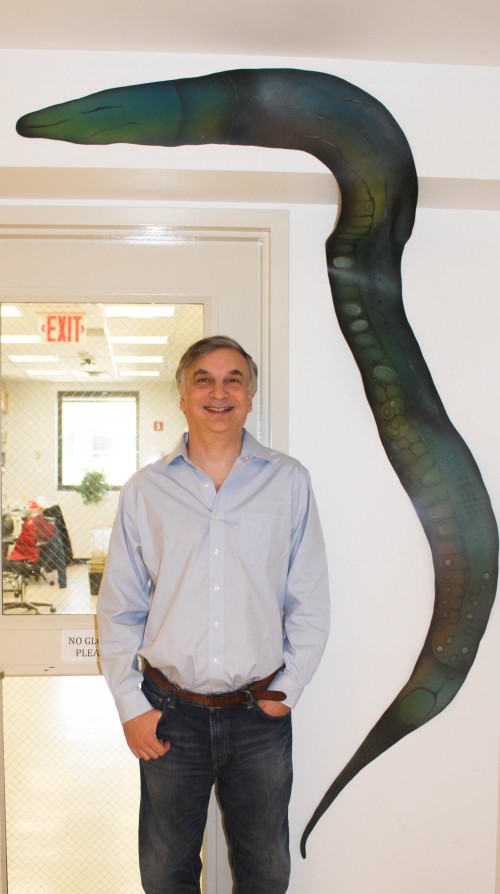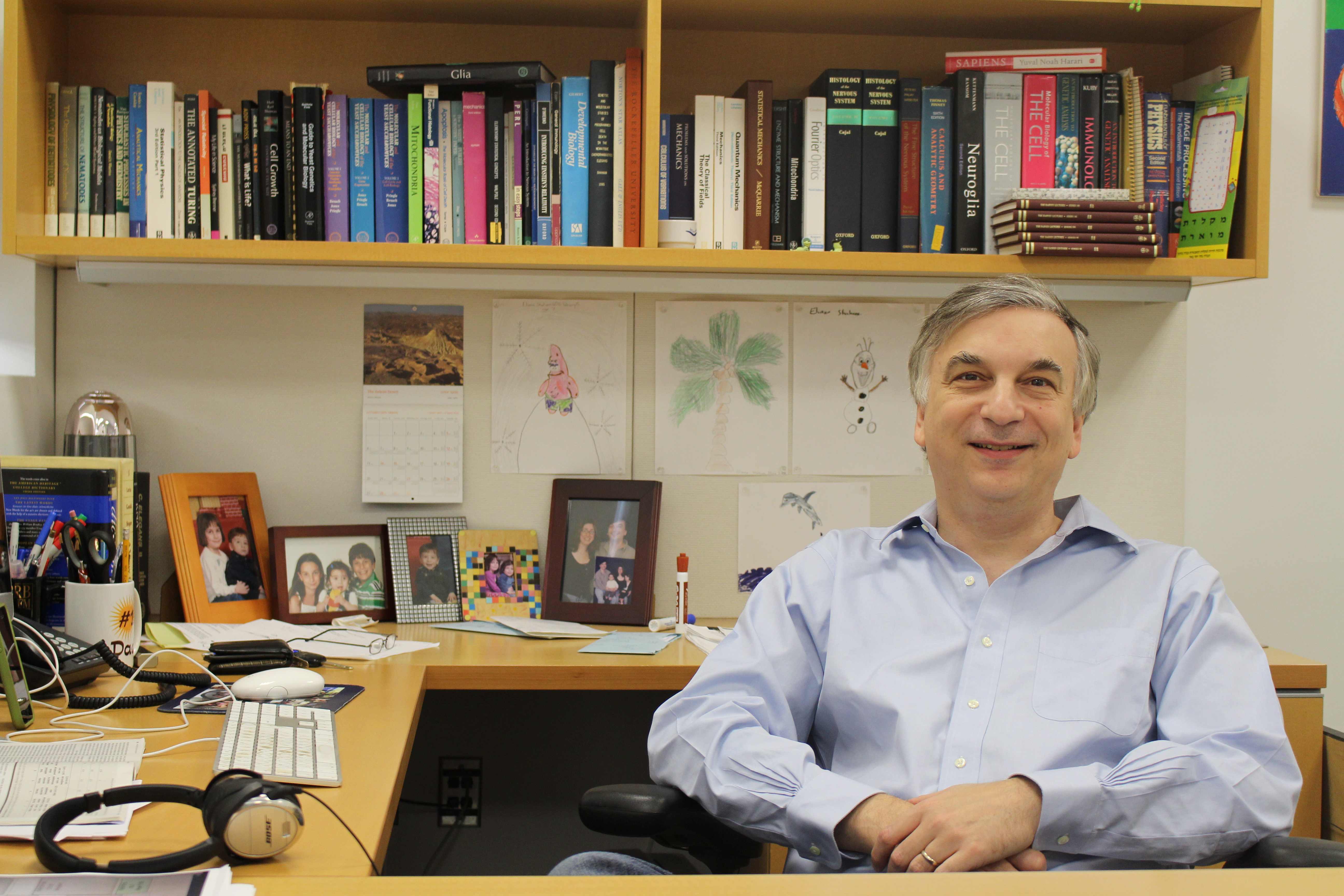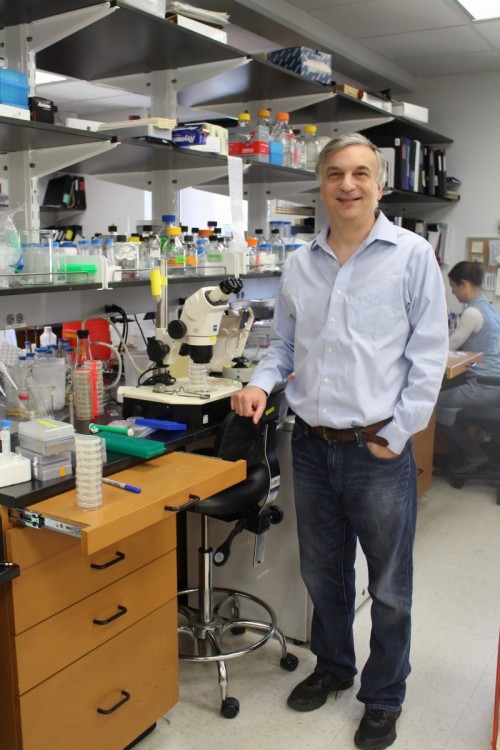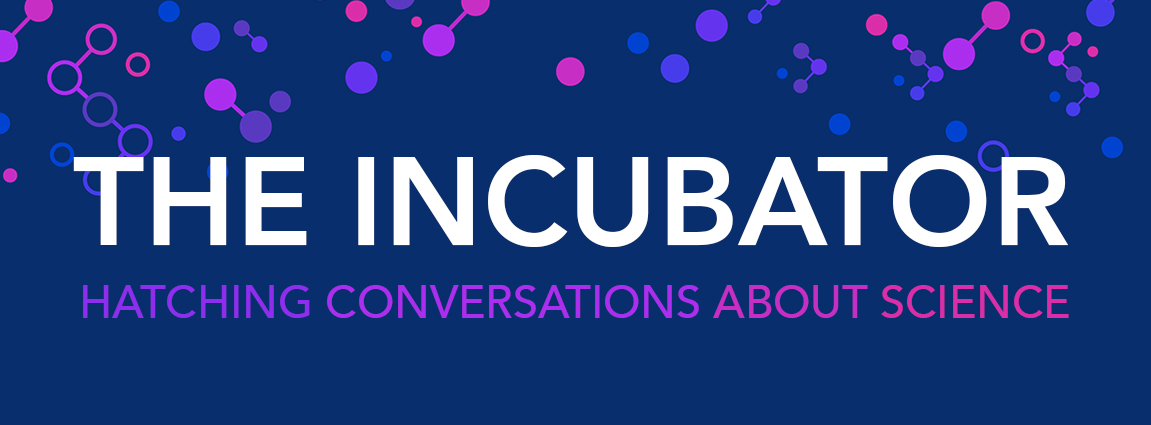Shai Shaham on creativity in science and music
Steven Lewis sat down with Dr. Shai Shaham, head of the Laboratory of Developmental Genetics at Rockefeller University, to discuss how growing up surrounded by both science and music has shaped Dr. Shaham’s perspective on creativity. Research in the Shaham lab uses the roundworm Caenorhabditis elegans to study both programmed cell death during animal development and the roles of glial cells in nervous system development and function.

Shai Shaham outside his laboratory with one of two C. elegans created by Coco 144
What attracted you to science and who have been your biggest influences?
“The biggest influence for me going into science was probably my dad, who was an astrophysicist. Growing up, I heard about the science of celestial bodies and was always fascinated by it. I started out pretty sure I would become an astronomer or physicist.”
Your sister and brother, Orli and Gil Shaham, are professional musicians and I understand you play and perform as well. What was it like growing up in such a musical household?
“My parents were both musical. My mom is a human cytogeneticist and my dad was an astrophysicist and they both played. My mom played piano and my dad violin. I remember, growing up, they would play Beethoven sonatas together. So music was always around. Then when I was 4, I started playing the piano but didn’t quite put the time into that. I actually remember I taught my little brother to play a Disney song, “One Day My Prince Will Come,” on the piano. I was 5 and he was 2. We grew up in Israel and there used to be student concerts at our conservatory- I think that is where my brother and sister got hooked.
For me, getting hooked took a bit longer and occurred when we moved to the US in my teens. In Israel, I had a very opinionated piano teacher. She cared little for my interests, and I didn’t quite enjoy that. By contrast, my teacher in the US gave me an enormous amount of freedom. I loved listening to Brahms and she suddenly said, ‘why don’t you play Brahms’ and that really ignited a fire in me and got me more involved in music.”

When I hear you speak about music, I can tell you have a deep passion for it, and I’m sure it’s the same for science. I’d love to hear your thoughts on the creativity of science, possibly connections for you between music and science and if your musical passion ever informs your science.
“I don’t know that music directly informs my science, but in science, the way to put together a story is to start with an observation and use that kernel to expand and grow the original idea. You do follow up experiments and test different conditions. I think music is very much similar in that way. Music is usually built on small ideas, a small kernel, and the task is to develop an entire piece based on that little idea.
In both music and science, it is very difficult to build a convincing structure from your ideas. There are a lot of things that can go wrong when you try to put a story together, starting with your seed idea being wrong. And I think that holds for music too. There’s also the question of intuition. For example, if you give a motif to Bach and give the same motif to me, he’s going to be able to build it into something in a way that I could never hope to do. So there’s a way to develop things that comes from experience, mixed in with intuition- that sounds like science also. There are also experiments. Bach’s The Art of the Fugue is a great example. Here, he develops an idea in a bunch of different ways, some of which I think are more successful than others. So I think on these broad levels there is overlap. There’s also a similarity in the day-to-day work. I think both of these fields require extreme dedication, a lot of hard work, and being very careful about your technique.”
What role do you think scientists have to play outside of their field, whether it be the arts, politics, philosophy, writing? There are some interesting examples of this like Lewis Thomas, who wrote about science and I know you have performed before with your sister, who is a pianist.
“When we were little I used to play with my brother, but we never performed publicly. My sister, Orli Shaham, who is an amazing pianist, will sometimes bring up an opportunity for me. My “debut” in public performance was a New Year’s Eve Concert at the Saint Louis Symphony and I played with her a Dvorak Slavonic Dance. It was an awesome experience. Then, most recently, just a few months ago, we played here at Rockefeller together- this time Brahms.
My general thoughts are that if you are really good at one thing, it doesn’t mean, and often precludes being good at anything else. This is a famous Platonic concept: one man, one job. So, I don’t feel comfortable when somebody in one field gives advice about another field. For example, you’ll see an article where a Nobel laureate in one field or another has caught the media’s attention, and is asked to comment about something that’s not in their field at all. I think the expectation that excellence in one endeavor means competency in another is often wrong. Look at Michael Jordan and his basketball vs. baseball careers.
That being said, with general principles like we’ve been discussing, useful concepts that transcend fields do exist. Methodologies for pursuing a problem, defining criteria for evaluating success of a project, or lack of success. General ways of thinking about things- that can be very useful and productive. It’s not a coincidence that the revolution inodern biology was spearheaded by physicists like Delbruck, Gamow, Benzer, Crick.”

What are the most rewarding and most challenging aspects of day-to-day running a lab?
“The most rewarding thing for me…well there are a few different things actually. I love seeing how a construct of my mind, that exists nowhere in the physical universe, becomes something physical, or real. I think that is amazing. That actually is also true of music. When you think about composers and all that is going on in their minds when they then give the music to musicians they can finally hear it. It’s wild. That something in the confined space of our mind can have a form outside that space.
I also love to see how people in the lab come in uninitiated and leave the lab with a confidence and strength of character and confidence that they now know what they are doing. It’s a really rewarding thing to see, and it’s probably not that much due to me, and just a natural part of their growth process, but fun to see nonetheless.
Then the most challenging thing about the lab…well I think at least when I went into science I was very self-absorbed about it. Just curious about the world and trying to solve puzzles. And the one thing about the lab is there are people other than you and it becomes very important very quickly to realize that people have different personalities, motivations and things that make them tick. And as a lab head, you need to be able to navigate that and it’s not always straightforward because everyone has a different way of doing things. It can be challenging to navigate, but very much necessary, as it allows you to pursue the things you love!”
Steven Lewis is a junior at Yale majoring in molecular biology and history from Scarsdale, New York. This past summer, Steven was a SURF student at Rockefeller studying pediatric brain diseases in the Gleeson lab and previously worked at Rockefeller while in high school as a part of the SSRP program studying immunology in the Krueger lab. Steven enjoys playing in the Yale Symphony Orchestra and has written about biotech, science, and medical research for the Yale Daily News.
